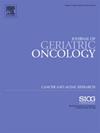老年癌症幸存者纵向虚弱状态转变的种族差异
IF 3
3区 医学
Q3 GERIATRICS & GERONTOLOGY
引用次数: 0
摘要
黑人老年癌症患者在癌症治疗期间处于脆弱的高风险,但在生存期长期脆弱状态转变的种族差异尚未得到充分研究。材料和方法我们使用国家健康与老龄化趋势研究的第1-9轮(2011-2019)对老年癌症幸存者(≥65岁)进行了纵向分析。一个多状态马尔可夫模型评估了Fried脆弱表型状态(健壮、易弱、易弱)和死亡之间的一年转变,并按自我报告的种族(黑人与非黑人)分层。结果1303例幸存者中,55%为女性,24%为黑人,76%为非黑人。与非黑人幸存者相比,黑人幸存者更不可能保持强壮(50%对57%),更可能保持虚弱(46%对39%),更可能死亡,更可能过渡到更差的虚弱状态(例如,从强壮到虚弱或虚弱)。讨论黑人老年癌症幸存者比非黑人同行经历更差的虚弱轨迹,突出了有针对性的生存护理以改善长期结果的必要性。本文章由计算机程序翻译,如有差异,请以英文原文为准。
Racial disparities in longitudinal frailty state transitions among older cancer survivors
Introduction
Black older patients with cancer are at high risk of frailty during cancer treatment, yet racial disparities in long-term frailty state transitions during the survivorship phase are understudied.
Materials and Methods
We conducted a longitudinal analysis of older cancer survivors (≥65 years) using rounds 1–9 (2011–2019) of the National Health and Aging Trends Study. A multistate Markov model assessed one-year transitions across Fried frailty phenotypes states (robust, prefrail, frail) and death, stratified by self-reported race (Black vs. non-Black).
Results
Among 1303 survivors, 55 % were female, 24 % Black, and 76 % non-Black. Black survivors were less likely to remain robust (50 % vs. 57 %), more likely to stay frail (46 % vs. 39 %), more likely to die, and more likely to transition to poorer frailty states (e.g., robust to prefrail or frail) than non-Black survivors.
Discussion
Black older cancer survivors experience poorer frailty trajectories than non-Black counterparts, highlighting the need for targeted survivorship care to improve long-term outcomes.
求助全文
通过发布文献求助,成功后即可免费获取论文全文。
去求助
来源期刊

Journal of geriatric oncology
ONCOLOGY-GERIATRICS & GERONTOLOGY
CiteScore
5.30
自引率
10.00%
发文量
379
审稿时长
80 days
期刊介绍:
The Journal of Geriatric Oncology is an international, multidisciplinary journal which is focused on advancing research in the treatment and survivorship issues of older adults with cancer, as well as literature relevant to education and policy development in geriatric oncology.
The journal welcomes the submission of manuscripts in the following categories:
• Original research articles
• Review articles
• Clinical trials
• Education and training articles
• Short communications
• Perspectives
• Meeting reports
• Letters to the Editor.
 求助内容:
求助内容: 应助结果提醒方式:
应助结果提醒方式:


